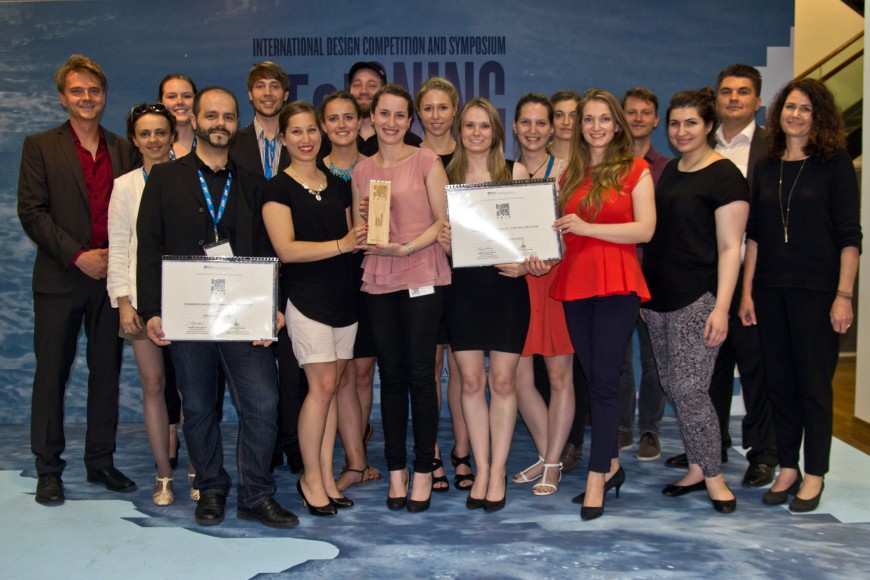Urban Resilliance – success in the international design competition
TU Darmstadt wins overall design excellence award and a honourable mention
08.07.2015
“Designing Resilience in Asia 2015 – International Design Competition”, NUS Singapore In recent years, planning for urban resilience – as a capability to prepare for, respond to and recover from significant multi-hazard threats with minimum damage – is well under way in a number of cities all around the world. This task is, however, not so easy to accomplish, due to its extremely complex nature, created mainly by the former unsustainable growth programmes and rising climate change issues.

Local authorities and their inhabitants are therefore increasingly facing problems of droughts, floods, air pollution, land degradation, deforestation and rising sea levels. One of the most vulnerable regions to the effects of climate change is South-East Asia, but is at the same time characterized by the highest rate of urbanisation. In order to promote both innovative responses to disaster situations and society engagement through design, students of urban design, architecture and building science were invited to participate in an International Design Competition and Symposium 'Designing Resilience in Asia 2015' that seeks to engender Asian communities’ resiliency in light of natural disasters. The event took place from 29th to 30th June 2015 at the National University of Singapore’s School of Design and Environment. A group of students representing TU Darmstadt was lead by Prof. Dr. Annette Rudolph-Cleff and her team from the Urban Design and Development Unit (est), Faculty of Architecture.
Overall design excellence prize was awarded to the design project “Start Small-Grow Strong” (Sandro Bellini, Hannah Freund, Nadine Jezernik, Vera Kallenbach, Neele Leson, Beata Preiger, Jennifer Weil, Ann-Cathrin Winkelmann). One of the two honourable mentions was awarded to the design project “Technature” (Alexander Habermehl, Alexandru Oprea, Charlotte Schauer, Daniel Mario Appari, Dominika Czajkowska, Robert Maximilian Sand, Sandra Leipe, Sandra Michel, Shirin Safaei, and Sonja Müller). Both winning entries are a result of teaching modules on Faculty of Architecture, started with preparatory one-week workshop on urban resilience in WS 2014/15, and fully developed during the urban resilience design module in SS 2015.
The panel of judges was composed of the following four renowned international experts: Prof. Dr. Marie Aquilino from Ecole Spéciale de l’Architecture (ESA) from Paris, France, Prof. Dr. Rohit Jigyasu, President of ICOMOS-India and ICOMOS International Scientific Committee on Risk Preparedness, Prof. Dr. Reena Tiwari from Curtin University, Australia, and Prof. Dr. Esther Charlesworth from RMIT University, Australia. Introductory lectures in the frames of a symposium, provided by the jury members, was an important input on different aspects and issues of urban resilience today. The competition itself involved presentations of sixteen design schemes by the participating teams from ten universities all around the world: Université de Montréal from Canada, South China University of Technology (SCUT) from China, Bangladesh University of Engineering and Technology (BUET) from Bangladesh, National University of Singapore from Singapore, Centre for Environmental Planning and Technology University (CEPT) from India, Technische Universität Darmstadt from Germany, National Cheng Kung University from Taiwan, RMIT University from Australia, Institut Teknologi Bandung (ITB) from Indonesia and Louisiana State University from the USA.
The winning teams from the Faculty of Architecture TU Darmstadt have been supervised by a group of experts from Urban Design and Development Unit, headed by Prof. Dr. Annette Rudolph-Cleff, involving Dipl.-Ing. Britta Eiermann, Dr.-Ing. Nebojša Čamprag, Dipl.-Ing. Simon Gehrmann and M.Sc. Yang Li. The student teams also received necessary support concerning some special issues of urban planning and design from Mr. Dan Lewis from UN Habitat and Dr. Yunsheng Su from Tongji University Shanghai, as well as by Dr. Susanne Bieker from IWAR Institute of the TU Darmstadt concerning water infrastructure planning. Theoretical support was provided by Dr. Gertrud Tauber and by experts from the Deutsche Gesellschaft für Internationale Zusammenarbeit (GIZ) Ms. Gesa von Engelbrechten and Mr. Martin Dirr.





